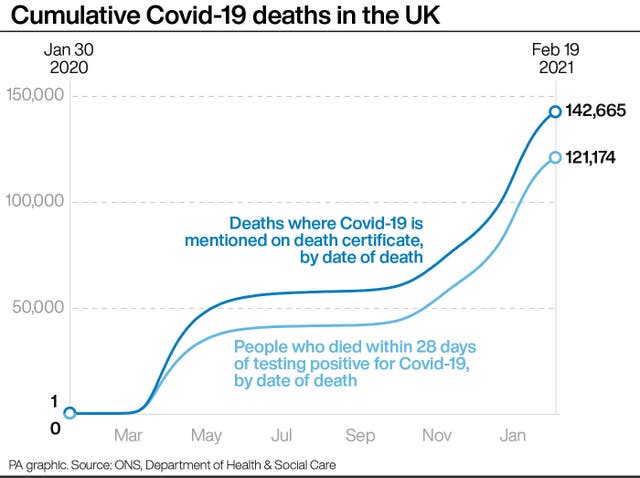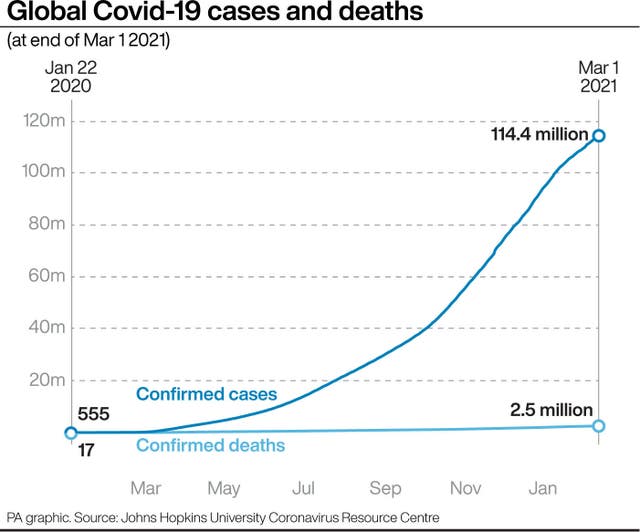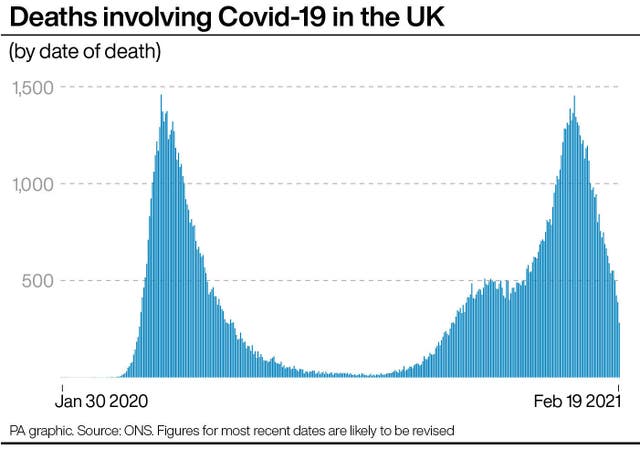Real-world data on Pfizer and Oxford vaccines is ‘stunning’, scientist says
Professor Andrew Pollard said leaders around Europe, where around 5,000 people are dying every day from Covid, will take note of the findings.

Real-world data on the effectiveness of the Oxford and Pfizer vaccines is “stunning” and countries across Europe will take note, a scientist behind one of the jabs has said.
Professor Andrew Pollard, director of the Oxford Vaccine Group, welcomed the new study from Public Health England (PHE) which found that protection against developing symptomatic Covid-19 in the over-70s was around 60% for both Oxford and Pfizer after a single dose, while among the over-80s the vaccines offered more than 80% protection against hospital admission.
Prof Pollard told BBC Radio 4’s Today programme the findings were “stunning”, and this was for two reasons.
“First of all, because these data come from the hardest group to protect – those who are the frailest, the oldest adults in our population – and we’re seeing an 80% reduction in hospitalisation in that group, which is stunning,” he said.
“Second… both of the vaccines performed exactly the same, there was no daylight between them.
“We’ve had all this difficulty with communication, particularly around Europe, with uncertainty about the evidence, whereas in the UK we’ve been rolling out both vaccines in the confidence that they would both give high levels of protection.
“And that’s absolutely what we’ve seen now in this real-world evidence – that whether you’ve had a Pfizer vaccine or the Oxford AstraZeneca vaccine, you have very high levels of protection.”


Prof Pollard said around 5,000 people are dying every day from Covid across Europe, where some leaders have shunned the Oxford vaccine for older age groups.
Prof Pollard said: “It just shows how critical it is to improve public confidence across the continent about the vaccines, and that’s why the data that appears today is so important – to show that both of the vaccines which are widely available in Europe can have this big impact.”
Asked about France reversing its decision not to recommend the Oxford jab for over-65s, Prof Pollard said he thought many countries would now be looking at the latest data.
Asked if concern over the Oxford jab had been disappointing, he said it was “disappointing in some senses, but it’s important to remember that the way in which scientific committees in different countries make their decisions is quite different.

“There’s rules that these committees follow in making their decision-making.
“Here in the UK, the decision-making takes a lot more into account in terms of the biology and an understanding of the science of vaccines, and that allows innovative approaches to immunisation even when the data around them may be more limited.
“But at no time has there been any concern about safety of any of the vaccines. They all look extremely good on safety, and all of the data has always suggested that we would have good protection in all age groups.”
Prof Pollard said future vaccines may well be able to tackle the P1 Brazil variant that has been found in the UK as well as the South African variant.
“The work at the moment is partly to understand whether a vaccine for one of them might actually protect against both so there’s a lot more that we don’t know yet about this, but all the developers are working on new vaccines to make sure we are ready if we need to be,” he said.

Trials of the Oxford vaccine have already started on younger age groups down to 12 years of age, with trials on younger groups starting soon, and results expected towards early summer, he added.
It comes after Professor Anthony Harnden, deputy chair of the Joint Committee on Vaccination and Immunisation (JCVI), said the “bold” decision to delay second vaccine doses so more older people could be protected by a single dose more quickly had saved lives.
He said: “These real world results from Public Health England demonstrate a very good effect from both vaccines after the first dose.
“The Covid vaccination strategy was designed to prevent as many deaths as quickly as possible.
“The bold decision to vaccinate more older people by delaying the second dose has undoubtedly saved a large number of lives.”
In the PHE study, protection against developing symptomatic Covid-19 in the over-70s ranged between 57% and 61% for one dose of Pfizer and between 60% and 73% for the Oxford/AstraZeneca vaccine.

Over-80s who had been vaccinated with one dose of either jab had more than 80% protection against hospital admission, while the Pfizer jab was 85% effective at preventing death from Covid-19.
More data is being analysed on how the Oxford jab prevents death, while further figures for the over-70s are expected shortly.
PHE has identified six UK cases of the P1 variant first detected in the Brazilian city of Manaus – three in England and three in Scotland.
Dr Susan Hopkins, of PHE, said they were tracking “very closely” the new variant and are in the process of trying to track down the one person who is yet to be identified who is believed to have taken a test on February 12 or 13.
Health Secretary Matt Hancock is due to address MPs on the latest coronavirus developments in the Commons on Tuesday, a date which marks 12 weeks since the UK vaccine rollout began.





